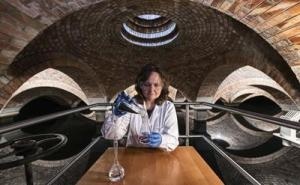Oct 20 2016
 New palladium and nickel catalysts, examined at the IPC PAS in Warsaw, Poland, efficiently remove harmful organochlorine compounds from water. Dr. Anna Srebowata presents the new method in vintage interiors of the Municipal Water Supply and Sewerage Company in Warsaw. (CREDIT: IPC PAS, Grzegorz Krzyzewski; thanks to MWSSC Warsaw)
New palladium and nickel catalysts, examined at the IPC PAS in Warsaw, Poland, efficiently remove harmful organochlorine compounds from water. Dr. Anna Srebowata presents the new method in vintage interiors of the Municipal Water Supply and Sewerage Company in Warsaw. (CREDIT: IPC PAS, Grzegorz Krzyzewski; thanks to MWSSC Warsaw)
Recently, two new catalysts have been developed by the Institute of Physical Chemistry of the Polish Academy of Sciences in Warsaw in partnership with the Jagiellonian University in Cracow and the Jan Kochanowski University in Kielce. These catalysts have been designed especially for effective treatment of tap water and also for the elimination of harmful chlorine compounds.
In the year 2008, the presence of trichloroethylene was surprisingly detected in the tap water in the village of Srebrna Gora in Lower Silesia. Trichloroethylene is a carcinogenic compound that supports the development of leukaemia and lymphoma.
When analyzed, they found that a paints and solvents production factory, that was function two decades ago, was the source of contamination. Specifically in Poland, post-industrial pollution because of chlorine compounds take place many times within a year. Using these newly developed catalysts, such hazards can be either prevented, or their adverse impacts can be eliminated to a large extent.
Research groups from the Institute of Physical Chemistry of the Polish Academy of Sciences (IPC PAS) in Warsaw, Poland, the Jagiellonian University (UJ) in Cracow, and the Jan Kochanowski University (UJK) in Kielce were involved in this project. These new catalysts are more efficient and cost-effective compared to catalysts that are currently known.
These catalysts are expected to improve the use of hydrodechlorination reaction that can efficiently remove organic compounds containing chlorine and also effectively purify water.
As far as trichloroethylene is concerned, it is a colorless liquid that is most often used as a solvent for fats among other substances. If Trichloroethylene is dropped in a tank it does not dissolve, instead it sinks to the bottom of the tank and is expected to remain there for years.
If the tank is used for drinking water purposes during this period, trichlorethylene deposits might mix with water taken up by the water supply and there also might be a disturbance of balance between the liquids. Additionally, there are chances of trichloroethylene getting evaporated and transmitting over distances, polluting the environment. For instance, China's industry is a source of danger for Europe.
Trichloroethylene may enter our bodies when we consume food, while bathing, or even through inhaling. In small quantities, this compound causes abdominal pain and vomiting. However, if its concentration in the water exceeds the norm for a longer period, victims may suffer damage to the liver, heart and brain, as well as the development of cancer, particularly leukaemia, lymphoma and bladder cancer. Fast and cheap methods of removing trichlorethylene from water are therefore of great importance to society.
Dr. Anna Srebowata (IPC PAS)
PhD student Izabela I. Kamińska (IPC PAS) elaborates the details of the research as follows: "Organic compounds of chlorine can be removed from water by a reaction known as hydrodechlorination. It uses small amounts of hydrogen and a suitably selected catalyst, usually palladium. The ensuing reaction causes organochlorine compounds in the water to be converted into non-toxic substances - saturated and unsaturated hydrocarbons. In the case of the reaction with trichlorethylene, these are ethane and ethylene."
As palladium is a costly element, uniform distribution of this element’s nanoparticles on the surface of the support is important. This condition is satisfied by the catalyst developed at the Jagiellonian University on a base of zeolite ZSM5, which is a porous silica-alumina that has an ordered structure.
A catalyst, as shown in the IPC PAS measurements, is obtained after rinsing off the silicon atoms and then covering the material with palladium. This catalyst is extremely effective in removing trichlorethylene from water. From a practical point of view, it is equally important to immediately obtain a reduce form of the palladium catalyst so that it can be readily used after synthesis.
For many years it was thought that zeolites are not suitable for the hydrodechlorination reaction because they are not resistant to the reaction mixture. In our experiments we have shown, however, that they can be used to create a highly efficient palladium catalyst. It is the high yield and speed of action that make the new catalyst so interesting, despite the use of palladium.
Dr. Anna Srebowata (IPC PAS)
Nickel catalysts prove to be a potential alternative to precious metals. Such a material was attained on a base of ordered carbon structures that was developed by the UJK chemists. These structures are characterized due to the presence of mesopores (pores with sizes of numerous dozen nanometers). Carbon materials that were produced by this technique at the IPC PAS had a coating of nickel applied to them, and has been reduced to the metallic phase.
We have demonstrated that a catalyst composed of nickel supported on mesoporous activated carbon removes trichlorethylene from water. Although the process of hydrodechlorination itself takes place slightly more slowly than in the case of palladium catalysts, there are, however, important economic factors, because nickel is a relatively inexpensive element. In addition, our new catalyst works even in small amounts and degrades very slowly, which confirms our belief that it can be an excellent replacement for expensive noble metals.
Dr. Anna Srebowata (IPC PAS)
Research on hydrodechlorination catalysts was undertaken at the IPC PAS under the SONATA grant received from the Polish National Science Centre.